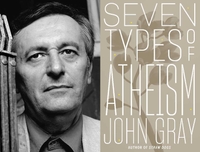Seven Types of Atheism
John Gray. Farrar, Straus and Giroux, $25 (192p) ISBN 978-0-374-26109-2
Reviewing the lives, principles, and practices of prominent and obscure atheists from centuries past, Gray (Straw Dogs) challenges the presuppositions and positions of contemporary atheists and secular liberals in this powerful book. By looking back at mystical atheists such as Meister Eckhart and Arthur Schopenhauer, or “God-haters” such as Fyodor Dostoyevsky and the Marquis de Sade (as well as movements such as monism, positivism, Nazism, and communism), Gray peels back the godless sheen to show that much of what is called “atheist” is actually quite religious. He argues that the only real difference between traditional conceptions of atheism and religion is that, in place of a monotheistic God, atheists found faith in humanity and its ability to improve as a species. Many of the examples Gray cites show a zealous commitment to humans “self-realizing” in the midst of history—whether through an uprising of the working class, technology, or Nietzschean Übermensch ethic. Gray sees this belief as just as far-fetched as that of a deity who spoke the world into being. Going after the sacred cows of atheism, Gray’s work is more of a polemic than it is pure explanation or historical overview. Although prone to some sweeping statements, Gray alluringly invites readers to reconsider what atheism is and should be. [em](Oct.)
[/em]
Details
Reviewed on: 08/27/2018
Genre: Nonfiction
Compact Disc - 978-1-9786-4416-8
MP3 CD - 978-1-9786-4417-5
Paperback - 176 pages - 978-1-250-23478-0
Paperback - 176 pages - 978-0-14-198110-9


